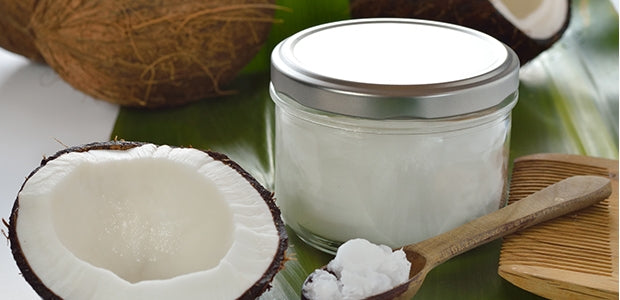Discover the culinary and therapeutic benefits of coconut
The origin of coconut
Once upon a time, there was an impostor who, contrary to its name, was not a nut, but a fruit! We're talking about coconuts, the fruit of the coconut palm (Cocos nucifera), which can be found all over the Southern Isles and East Asia. The coconut is an explorer in its own way, taking advantage of the fact that it floats to colonize the tropical shores of 5 continents. The Portuguese and Spanish first came across it in the 16th century during their great maritime expeditions. Intrigued by its 3-eyed head shape and hairy monkey face due to the brown fibers that surround it when ripe, they named it the coconut.
A nutritious and beneficial food
Its hard shell weighs from 1 to 1.5 kilograms and contains ½ liter of coconut water or albumen, which, when dried in the sun, solidifies and becomes flesh, called copra, from which milk and oil are extracted. Copra was used as the first cooking fat by Asians and Africans before Europeans arrived and recorded everything as discoveries in their great history books. Natives also used it as a thirst-quenching and rehydrating drink, as a base for their daily meals and as medicine.
Coconut has proved a thousand times over that its water, rich in vitamin E, minerals and electrolytes, can be used to treat a wide range of ailments. It has a stimulating effect on the kidneys. It is rich in antioxidants (manganese), which promote heart health by neutralizing free radicals.
What's more, the sterols present in coconut act like progesterone, a hormone that boosts bone density and strength. It is high in dietary fiber and low in calories, which makes you feel full and prevents constipation; not to mention that it reduces the risk of coronary heart disease and can help control type 2 diabetes.
What's more, the sterols present in coconut act like progesterone, a hormone that boosts bone density and strength. It is high in dietary fiber and low in calories, which makes you feel full and prevents constipation; not to mention that it reduces the risk of coronary heart disease and can help control type 2 diabetes.
Recent studies on coconut
In the past, coconut has been put on the back burner of pantries and fridges because 85% of its calories come from saturated fatty acids. These saturated fatty acids contain a high proportion of the medium-chain lauric acid found in breast milk. This lauric acid is used as fuel by the brain, increasing energy, promoting weight loss and raising good cholesterol levels. What's more, it has incredible antiviral power, stimulating the immune system against viruses and bacteria.
Quickly digested and burned by the liver, it reduces appetite. A diet-health tip: taking a tablespoon of coconut oil 20 minutes before meals will reduce your tendency to large portions and activate the metabolic process for digestion, burning fat instead of storing it. Same thing if you suffer from type 2 diabetes: coconut oil doesn't cause any upward spike in blood sugar levels, so there's no blood sugar crisis on the horizon.
Quickly digested and burned by the liver, it reduces appetite. A diet-health tip: taking a tablespoon of coconut oil 20 minutes before meals will reduce your tendency to large portions and activate the metabolic process for digestion, burning fat instead of storing it. Same thing if you suffer from type 2 diabetes: coconut oil doesn't cause any upward spike in blood sugar levels, so there's no blood sugar crisis on the horizon.
Daily care and nutrition
Coconut milk and water are ideal beverages for athletes, remineralizing, re-energizing and balancing blood pressure. For pregnant women, milk and pulp work miracles, moisturizing, reducing swollen ankles, boosting the immune system and preventing morning sickness and constipation.
Although this list is by no means exhaustive, coconut oil can be used to
Although this list is by no means exhaustive, coconut oil can be used to
For cooking
- for high-heat cooking
- in many recipes
For personal care
- make-up remover
- skin moisturizer
- deodorant
- hair conditioner
- apply a thin layer around the eyes to prevent wrinkles and on the hands to prevent scabbing
- homemade toothpaste (simply mix equal parts oil, baking soda and a few drops of peppermint essential oil).
Coconut essential oil
Its exotic aroma is an incredible stress reliever that relaxes, soothes anxiety and puts us in a good mood. But that's not all: coconut essential oil also acts as a mosquito repellent, soothes and heals the skin against burns and cuts.
The 365-day coconut tour isn't over yet. Will there be coconut-powered car engines soon, or a patented cure for certain cancers and chronic diseases? For the time being, one thing's for sure: you won't see coconut palms in the same way on your next vacation in the South, and that's just as well... unless a nut falls on your coconut!


